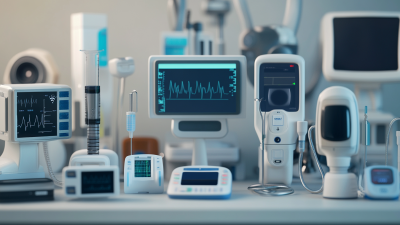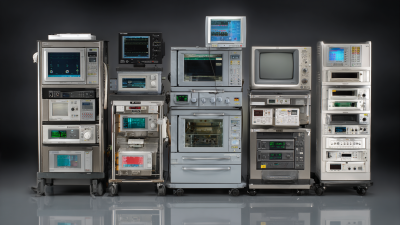Advantages of Home Medical Solutions for Enhanced Recovery
With the growing emphasis on patient-centered care, Home Medical solutions are increasingly recognized for their role in enhancing recovery outcomes. According to recent data from the Centers for Disease Control and Prevention (CDC), approximately 90% of patients prefer receiving care in the comfort of their homes when feasible, leading to improved satisfaction and adherence to treatment plans.

Additionally, a study published in the Journal of the American Medical Association (JAMA) indicates that home-based care can reduce hospital readmission rates by up to 25%, showcasing its potential to alleviate strain on healthcare systems. As we explore the various benefits of Home Medical solutions, it becomes evident that they not only facilitate faster recovery but also empower patients by providing a supportive environment tailored to their unique needs, ultimately transforming the landscape of post-acute care.
Benefits of Home Medical Solutions in Reducing Hospital Readmission Rates
Home medical solutions are gaining recognition as effective alternatives in the continuum of care, particularly in reducing hospital readmission rates. One of the primary advantages of these solutions is that they provide personalized care in a familiar environment, which can significantly enhance patient recovery. When patients receive treatment at home, they are more likely to adhere to their recovery protocols and engage actively in their healing process. This familiarity can lead to lower stress levels, ultimately translating to better health outcomes and reduced chances of returning to the hospital.
Moreover, home medical solutions often include regular monitoring and support from healthcare professionals, which allows for timely interventions if complications arise. This proactive approach can help manage chronic conditions more effectively, minimizing the need for readmission. By addressing potential issues early, healthcare providers can work collaboratively with patients and caregivers, ensuring that recovery plans are adapted to individual needs. As a result, patients not only experience improved health and well-being but also benefit from decreased healthcare costs associated with avoidable hospital stays.
Advantages of Home Medical Solutions for Enhanced Recovery
| Benefit | Description | Impact on Readmission Rates |
|---|---|---|
| Personalized Care | Home medical solutions provide personalized treatment plans tailored to individual needs. | Lower rates of complications and improved adherence to treatment. |
| Continuous Monitoring | Remote monitoring tools allow for real-time health status updates. | Early detection of potential issues reduces the likelihood of readmission. |
| Accessibility | Easy access to care at home minimizes the need for hospital visits. | Decreases logistical barriers and supports health maintenance. |
| Patient Education | Education programs help patients understand their conditions and treatments. | Empowered patients are more likely to manage their health and avoid unnecessary readmissions. |
| Cost-Effectiveness | Home care is often more affordable compared to hospital stays. | Reduced financial strain encourages patients to seek timely outpatient care, lowering readmission risks. |
Statistics on Improved Patient Outcomes with Home Healthcare Services
Home healthcare services have become increasingly popular due to their proven impact on patient outcomes. Statistics suggest that patients who receive care at home experience faster recovery times compared to those in traditional healthcare settings. For instance, studies indicate that home care reduces hospital readmission rates by up to 25%, highlighting its effectiveness in managing chronic conditions and post-operative recovery. This trend is shaping a new landscape for patient care, where convenience and personalized attention lead to significant health improvements.

To maximize the benefits of home medical solutions, consider a few tips. First, ensure open communication with healthcare providers. Regular discussions about care plans and medication management can greatly enhance recovery. Additionally, establishing a comfortable and safe home environment can facilitate better healing. Simple adjustments, like removing tripping hazards and organizing the living space, can make a significant difference in a patient's well-being.
Moreover, engaging family members in the care process can improve adherence to treatment plans. Support from loved ones not only provides emotional comfort but also encourages a collaborative approach to recovery. By leveraging these strategies within home healthcare, patients can enjoy a smoother and more effective recovery journey.
Cost-Effectiveness of Home Medical Solutions Compared to Traditional Care
The cost-effectiveness of home medical solutions is becoming increasingly evident as more patients seek convenient alternatives to traditional care settings. Home healthcare not only minimizes expenses associated with lengthy hospital stays but also reduces the logistical costs of transportation. With the projected growth of the telehealth market, which is expected to see significant expansion through 2032, patients can access consultations and medical services directly from the comfort of their homes, making healthcare more accessible and affordable.
Moreover, advancements in medical technology, such as portable ultrasound devices and other home medical equipment, are further driving down costs. The rising demand for these innovative healthcare solutions is likely to fuel market growth, significantly influencing the healthcare landscape. For example, the home rental market for lifting chairs is projected to experience substantial growth, reflecting the increasing trend towards home healthcare solutions. This shift not only benefits patients by providing tailored care in familiar environments but also offers cost savings compared to conventional healthcare, proving that home medical solutions are a viable and economically smart alternative.
Role of Telehealth in Enhancing Patient Monitoring and Recovery at Home
Telehealth has revolutionized the traditional healthcare landscape, particularly in the realm of patient monitoring and recovery at home. With a significant shift towards remote care, recent data from the American Hospital Association reveals that 76% of hospitals now utilize telehealth services, benefiting both patients and providers alike. This trend not only enhances accessibility to medical professionals but also facilitates continuous monitoring of patients’ conditions, ultimately leading to improved health outcomes.
One of the standout advantages of telehealth is its ability to reduce hospital readmission rates. A study published in the Journal of Medical Internet Research found that telehealth interventions can lower readmission rates by approximately 20%. This is crucial for patients recovering from surgery or chronic illnesses, as it allows healthcare providers to detect potential complications early and intervene promptly. By utilizing remote monitoring technologies, patients can share vital signs and symptoms with their healthcare team, fostering a proactive approach to their recovery.
**Tip:** To maximize the benefits of telehealth for your recovery, ensure your device is equipped with the necessary applications and that you have a reliable internet connection.
Additionally, engaging in regular virtual check-ins with healthcare providers can enhance accountability and motivate adherence to recovery plans.
**Tip:** Keep a journal of your symptoms and recovery progress to discuss during your telehealth appointments for more tailored support.
Advantages of Home Medical Solutions for Enhanced Recovery
Patient Satisfaction and Engagement in Home-Based Healthcare Settings
The shift towards home-based healthcare settings has shown remarkable improvements in patient satisfaction and engagement. According to a 2021 report by the American Association for Homecare, over 90% of patients reported feeling more in control of their health when receiving care at home. This autonomy fosters a greater sense of responsibility and engagement in their treatment plans, significantly enhancing the overall recovery process.

Incorporating personalized care plans tailored to individual needs can further boost patient satisfaction in home healthcare environments. Engaging patients in their care decisions not only makes them feel valued but also improves adherence to treatment protocols. A study published in the Journal of Home Health Care Management & Practice found that patients who actively participated in their care reported a 25% increase in treatment satisfaction compared to those who did not.
Tips: To enhance patient engagement, healthcare providers should encourage open communication and set specific goals with their patients. Providing educational resources about their conditions can empower patients, making them more invested in their recovery. Additionally, utilizing technology, such as telehealth consultations, allows patients to stay connected and engaged with their healthcare team, thus promoting a collaborative approach to care.
Related Posts
-

7 Essential Tips for Finding the Best Medical Equipment Supplier Worldwide
-

Resilient Growth of Chinese Medical Monitoring Devices Amidst US China Tariff Challenges
-

Exploring Innovative Alternatives: Best Home Medical Equipment for Global Buyers
-

Challenges Faced When Selecting Best Used Medical Equipment for Your Facility
-

China's Resilient Growth in Medical Supplies Amid US China Tariff Parity
-

Leading the World in Health Monitoring Innovations from China's Premier Factories
